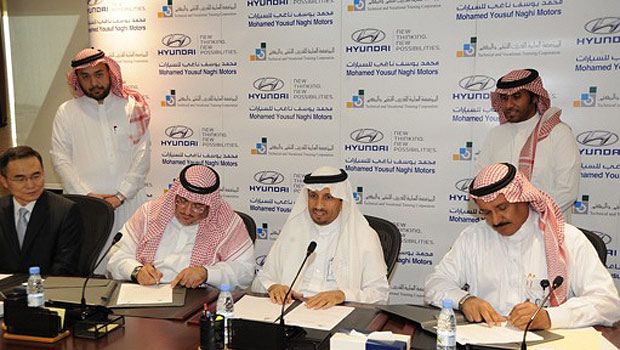
Riyadh, April 11: As part of an ambitious public-partnership plan to reduce dependence on foreign workers, the state-owned Technical and Vocational Training Corporation (TVTC) and Mohamed Yousuf Naghi Motors (MYNM) signed a memorandum of understanding (MoU) yesterday to train 400 young Saudis for jobs in automobile sector. On completion of the training, the MYNM, which has a nationwide network of sales and after-sales facilities for Hyundai cars, will provide employment to the Saudi graduates also.
The agreement was signed in the presence of TVTC Gov. Ali Bin Nasser Al-Ghafis who said that the Kingdom was committed to develop the public-private partnership initiative to provide technology training and tools for young Saudi boys and girls. Al-Ghafis said: "This was one of the major MoUs signed by the TVTC with private organizations, which will go a long way in providing necessary skills to Saudis to work in automobile sector."
He added that the Saudi trainees under this program will receive a monthly stipend of SR1,500 during the training period besides other benefits including medical insurance. "The training program will have components of Korean car technology with focus on a range of skills, which will help the trainees after two years of their employment to open their own workshops," said Al-Ghafis.
The MoU was signed by Hamad Al-Aqla, TVTC deputy governor, in a brief ceremony organized at the headquarters of the TVTC in the Saudi capital. Hazm Sami Jamjoom, NYNM managing director, inked the agreement representing Naghi Motors. Top TVTC officials and MYNM executives attended the event. After the signing ceremony, Fahad M. Al-Otaibi, TVTC media relations manager, conducted reporters on a tour of the exhibition hall to watch the models of new TVTC colleges.
Al-Aqla said: "This program with Naghi Motors will help to provide intensive training to Saudis and eventually the company will hire the graduates." Those joining the program will be given extensive lessons and practical training to become world-class auto mechanics, diesel mechanics, spare parts salesmen, auto technicians, painters and motor electricians."
He added that there was a greater scope for employment in automotive sector of the Kingdom, which is poised to sustain a positive growth outlook over a five-year period. In fact, the sales value of the automobile sector during the five-year period is expected to reach over SR80.6 billion, precisely by 2014. "The robust growth forecast is underpinned by the positive performance of the commercial vehicle segment, which is expected to remain strong over the next five years," said an executive of NYNM/Hyundai.
Asked about the major policies and the future plans of the TVTC, Al-Ghafis said the TVTC had endorsed similar agreements with a few major companies in different sectors. "The plan is to train workers for jobs that are in demand in Saudi Arabia," he said, adding that the new initiative launched by the TVTC is intended to help better align with technical college curriculums with the demands of local companies.
"Some similar partnerships between TVTC and private companies already exist," said Al-Ghafis. The TVTC is working hard to address the training needs of young Saudi boys and girls. "A number of studies, a number of discussions and several projects currently under way to address the skills' gap among Saudis, and how that's related to unemployment and how they can be addressed," he said while giving an overview of the TVTC's programs.
"The commitments from private partners are really commendable," said the TVTC chief, adding that the TVTC is helping to prepare skilled workers for the labor market by designing appropriate training programs and developing partnerships with the private sector. He added that the plan is under way to build 40 technology institutes for girls and 50 for boys in near future. The TVTC projects include the establishment of institutes for training, especially in strategically significant fields.
In fact, the total enrolment of Saudi boys and girls at the existing TVTC colleges exceeds 100,000 now. According to a TVTC report obtained by Arab News yesterday, the TVTC also selects qualified trainers to teach specialist training courses aimed at developing the skills. "The private sector has become a genuine partner of the TVTC in training technical workers," the report added.
It is also seeking international and domestic expertise to operate its training and professional institutes, said the report. The TVTC, which is a premier Saudi government organization entrusted with the task to train Saudi youngsters for jobs in different sectors, currently has 35 technical colleges for boys and 14 technical institutes for girls. It also owns and operates three institutes for military vocational training and 69 industrial institutes across the Kingdom.
On the other hand, the Naghi Motors is a well known name in automotive business, which is one of the best distributors of Hyundai cars in the region mainly because of its excellent sales service, customer handling and innovative support service programs. Naghi Motors is the first company to introduce leasing program for Hyundai cars and offer flexible credit terms. In a short span of time, the Naghi Motors has a strong network of sub-dealers and branches across the Kingdom.
It has its branches in Makkah, Madinah, Jazan, Tabuk, Taif, Khamis Mushayit, Abha, and Bisha, aside from several outlets in Jeddah. "Our ability to provide quality products and personalized after sales service has been instrumental in our rapid and successful growth," said Naghi Motors in a press statement here Tuesday.






Comments
Add new comment